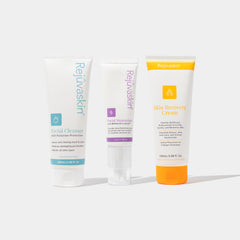Sensitive skin requires extra care and attention, and one of the most significant steps in maintaining skin health is opting for fragrance-free products. Fragrances, whether synthetic or natural, are common culprits of skin irritation, redness, and allergic reactions, making them unsuitable for individuals prone to eczema or dermatitis. This blog dives into the science behind fragrance sensitivity and why fragrance-free products, like Rejûvaskin’s Skin Recovery Cream, are essential for soothing and repairing sensitive skin.
The Problem with Fragrances in Skincare
Fragrances are widely used in skincare products to create appealing scents, but they can wreak havoc on sensitive skin. Studies have shown that fragrances are one of the leading causes of allergic contact dermatitis (ACD), affecting approximately 1% of the general population (Groot & Frosch, 1997).
How Fragrances Affect Sensitive Skin
-
Irritation: Fragrances can weaken the skin’s natural barrier, causing dryness, itching, and inflammation.
-
Allergic Reactions: Ingredients like balsam of Peru and fragrance mixes are among the most common allergens, as they can lead to rashes and prolonged redness (Tai et al., 2023).
-
Photocontact Dermatitis: Some fragrance components can cause skin damage when exposed to sunlight, increasing sensitivity (Lichter et al., 2020).
Fragrance-Free vs. Unscented: Know the Difference
It’s easy to confuse “fragrance-free” and “unscented,” but the two are not the same:
-
Fragrance-Free: Contains no added fragrance ingredients or masking agents, making it ideal for sensitive skin.
-
Unscented: May still contain masking fragrances to neutralize odor, which can trigger irritation in sensitive individuals.
Always opt for products labeled “fragrance-free” to minimize exposure to potential allergens.
Why Sensitive Skin Needs Fragrance-Free Products
For individuals with sensitive skin or conditions like eczema, avoiding fragrances is critical. Here’s why:
-
Strengthens the Skin Barrier: Fragrance-free products often focus on skin-repairing ingredients, reducing the risk of barrier damage.
-
Reduces Flare-Ups: Minimizing exposure to irritants prevents flare-ups associated with eczema and dermatitis.
-
Prevents Allergies: Continuous exposure to fragrance allergens can lead to sensitization over time, making skin more reactive (Basketter et al., 2015).
Rejûvaskin’s Skin Recovery Cream: A Safe, Fragrance-Free Solution
For sensitive skin, Rejûvaskin’s Skin Recovery Cream is a dermatologist-recommended solution that soothes, hydrates, and repairs the skin.
Key Benefits
-
Fragrance-Free: Perfect for those with sensitive or eczema-prone skin.
-
Hydration: Locks in moisture with soothing ingredients.
-
Barrier Support: Enriched with ceramides to restore the skin’s natural defenses.
-
Soothing Relief: Calms redness and irritation, promoting faster recovery.
This gentle yet effective cream is an excellent addition to any skincare routine focused on maintaining skin health and reducing irritation.
How to Build a Fragrance-Free Skincare Routine
Step 1: Choose a Gentle Cleanser
Look for soap-free cleansers that remove dirt without stripping moisture.
Step 2: Moisturize Daily
Apply a fragrance-free moisturizer like Rejûvaskin’s Skin Recovery Cream twice daily to hydrate and protect your skin.
Step 3: Protect with Sunscreen
Opt for fragrance-free mineral sunscreens to shield your skin from harmful UV rays.
Step 4: Avoid Triggers
Identify and avoid products with hidden fragrances or sensitizing ingredients.
Scientific Backing: Why Fragrance-Free is Essential
-
A study found that 15% of patients undergoing patch testing showed sensitivity to fragrance allergens, highlighting the widespread issue of fragrance-induced dermatitis (Tai et al., 2023).
-
Research also demonstrated that fragrances could aggravate eczema, especially in products frequently applied to the hands, face, or other sensitive areas (Sayapathi & Rowther, 2024).
Fragrance-free skincare isn’t just a trend—it’s a necessity for anyone with sensitive skin. By eliminating fragrances from your routine, you can reduce irritation, strengthen your skin barrier, and enjoy healthier, more resilient skin.
With Rejûvaskin’s Skin Recovery Cream, you can take a step toward fragrance-free care that truly works. Visit Rejûvaskin to explore products designed to soothe and protect sensitive skin.
Works Cited
-
Basketter, D., Lemoine, S., & McFadden, J. (2015). Skin sensitisation to fragrance ingredients. European Journal of Dermatology. Retrieved from link.
-
Groot, A., & Frosch, P. (1997). Adverse reactions to fragrances. Contact Dermatitis. Retrieved from link.
-
Sayapathi, B. S., & Rowther, S. (2024). Dermatitis secondary to exposure to nickel and fragrance. International Journal of Current Science Research and Review. Retrieved from link.
- Tai, V., Rosniza, S. N. C., & Tang, M. M. (2023). Contact sensitization to fragrance allergen. The Medical Journal of Malaysia. Retrieved from link
- Lichter, J., Sousa, M.S., Peter, N., Sahli, F., Vileno, B., Kuresepi, S., Gourlaouen, C., Giménez-Arnau, E., & Blömeke, B. (2020). Skin sensitization to fragrance hydroperoxides: interplay between dendritic cells, keratinocytes and free radicals. British Journal of Dermatology, 184. Link.





















Leave a comment